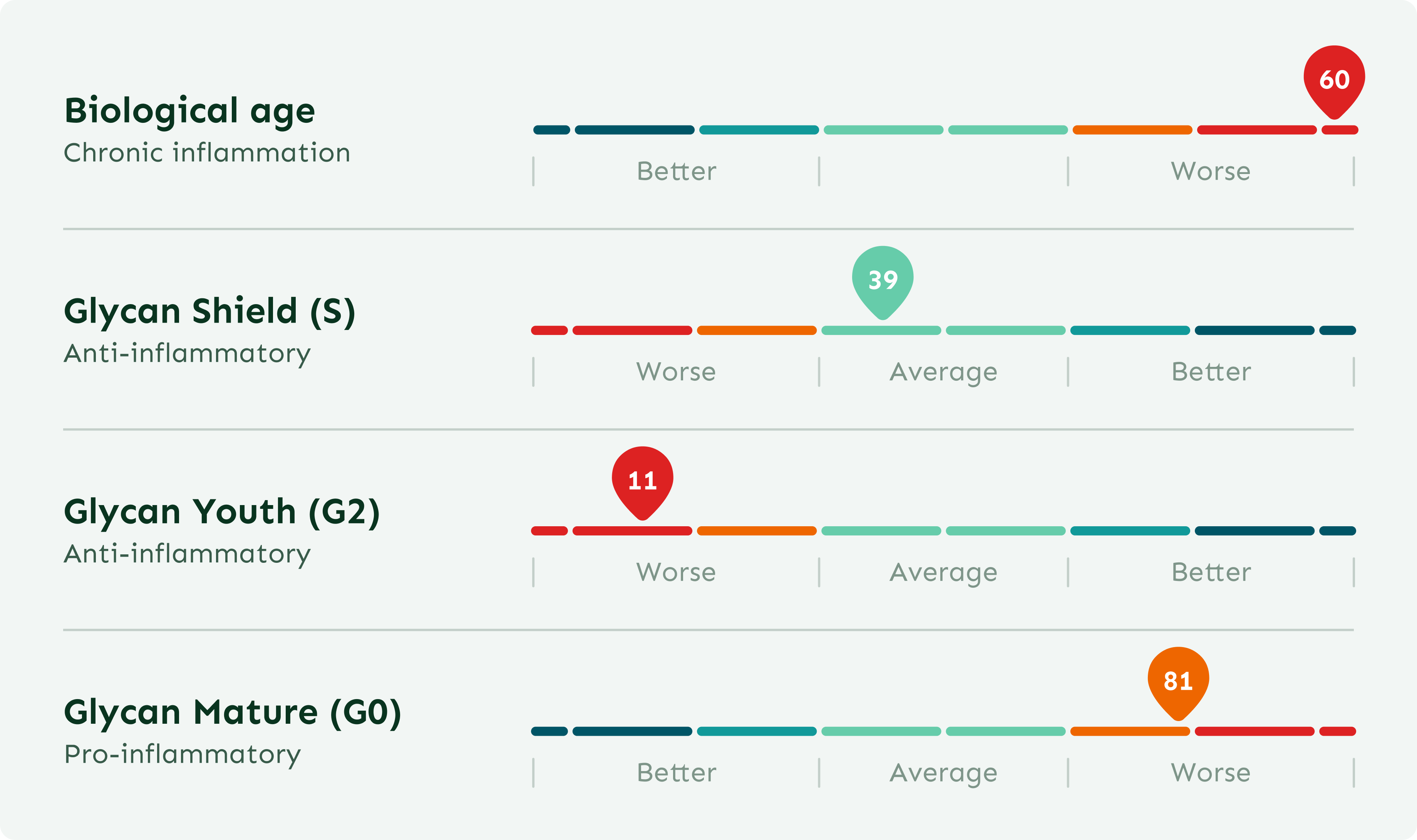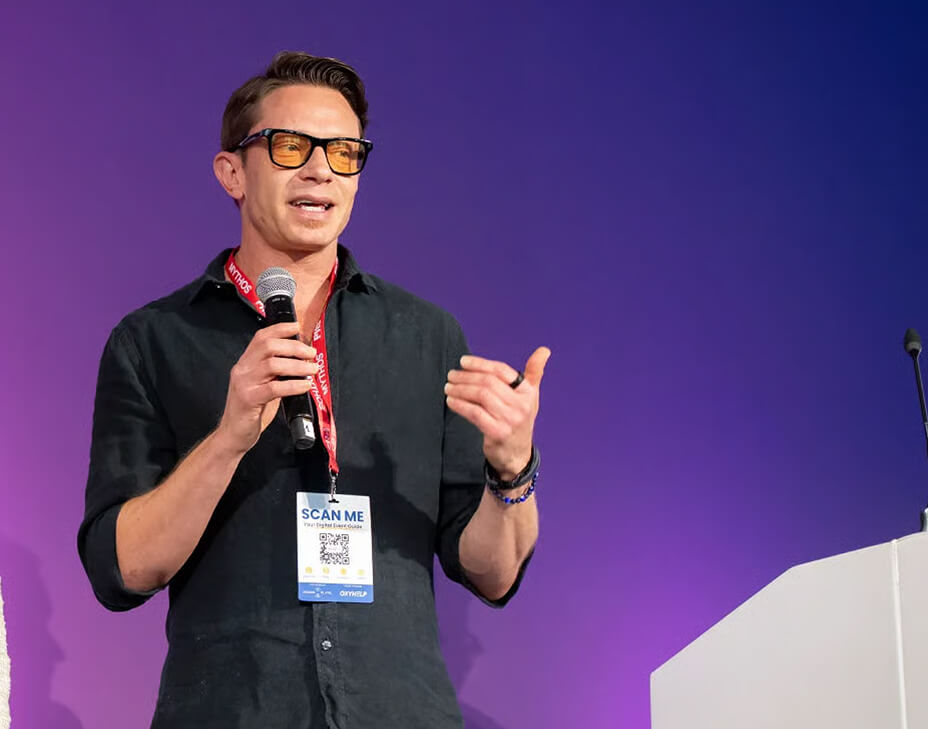Are You Stressing The Life Out Of You? (Literally)
What if stress is quietly aging you - despite your best efforts? Discover how chronic pressure impacts your biology, why your body might be holding onto stress you thought you’d moved past, and what your glycans can reveal about your true recovery.

Stress. We talk about it like the weather - daily, casually, and often without really thinking about what it means. So… what is stress, and what’s so stressful about it?
In fact, a little bit of stress - what scientists call eustress - can be good for you. It's what helps you nail that big presentation, pull off a last-minute deadline, or finish a marathon. It’s your body’s natural way of saying “let’s go!”
But then there’s the other kind - the one that lingers, creeps in quietly, and overstays its welcome. That’s distress, and it activates the infamous “fight-or-flight” response. Cortisol rises, adrenaline pumps, your heart races - your body thinks it’s time to run for your life.
Only... you’re not running. You’re just answering emails. Or sitting in traffic. Or scrolling through Slack. And that’s where the problem begins.
We’re Not Running from Lions - But Our Brains Think We Are
Here’s the paradox of modern stress: evolution wired us to escape predators, not inboxes. For most of human history, danger meant move or die. We’d fight, flee, burn off the cortisol, and get a dopamine reward for surviving.
But now? The threats are abstract. Deadlines. Bills. Zoom calls. And we deal with them... sitting down.
Our minds race while our bodies remain still. It’s the first time in human history that our stress response fires full-force - while we’re chained to a desk chair. No running, no fighting. Just a buildup of stress hormones with no release - and no reward. And it’s not just a day or two - this kind of stress builds up over time and eventually turns chronic. Suddenly, your body isn’t focused on living anymore - it’s focused on not dying.
And when your body is in stress - it cannot do anything else but focus on how to “save” you from the “chasing lion”.
- As a result, it shuts down your immune system - we don’t need to heal while we’re running for our life.
- It shuts down the reproductive system - we don’t have time to reproduce when we’re under threat.
- It slows down digestion - we don’t need to process food while escaping danger.
But when that state of survival stretches on for weeks, months, or even years - it starts to drain the healthy years out of us, accelerating aging and increasing the risk of chronic disease, ultimately reducing not just our lifespan but our healthspan too.
My Stress ≠ Your Stress: How Glycans Reveal What’s Going On Inside
Just like there’s not one kind of stress - there’s also not one kind of response to it. Whether stress turns into something chronic and harmful often depends less on what’s happening around us, and more on what’s happening within us.
And the truth is - my stress isn’t like your stress. What’s a kid’s game to one person can feel like a full-blown nervous system meltdown to another. It’s not about how big the stressor is, but how your body interprets and deals with it.
That’s what led us to investigate whether your biology could help explain that difference.In a study using a PTSD model in rats, researchers exposed all animals to the same traumatic event. Some developed signs of stress - withdrawal, anxiety, behavioral changes - while others didn’t. What set them apart? Their glycan profiles. Even before the event happened, the vulnerable group had distinct glycan patterns. In fact, one particular marker predicted vulnerability with up to 90% sensitivity.
Of course, these findings need to be studied further, especially in humans. But they suggest something important: stress resilience might not just be psychological - it could also be biological.
And we’ve seen this play out time and time again within our own community.
Clients who were doing everything “right” - eating well, training smart, sleeping consistently - still saw sudden spikes in their GlycanAge results after emotionally heavy periods. Like Nick, who experienced a sharp rise after a divorce, or our CEO, whose picture-perfect results shifted following a heartbreak.
So, it’s not just about the stress you feel. It’s about the stress your body remembers - and responds to.
The Manager’s Profile: When Being “On Top of Things” Starts Catching Up With You
Yes, but… what if we don’t even have the time to really feel how we feel?
What if we think we’re fine - managing, functioning, powering through - while something entirely different is happening underneath?
We’ve seen this again and again in our community: people who seem perfectly in control on the outside, yet show a very specific biological response on the inside. One glycan pattern in particular keeps emerging in these cases.
We call it the Manager’s Profile.
It’s a recurring signature we’ve observed in people with demanding, fast-paced lifestyles - founders, executives, frequent travelers… and yes, the family executives too - the Mums.
This profile typically shows:
🔺 Elevated biological age
🔻 Low Glycan Youth
🔺 High Glycan Mature
(See chart below for a typical example)
*This example is for illustrative purposes only and does not imply that all individuals with similar glycan values fall into this profile. Each result should be interpreted in context with individual lifestyle, clinical data, and personal health history.

It reflects a body under long-term pressure: disrupted recovery, irregular rhythms, and stress that’s become a baseline.
Okay, okay we know... you get it - it’s the too much stress. But you also can’t just be less stressed. Not in this chapter of your life.
Good news is, it’s not about eliminating stress altogether - but about knowing how to compensate for it.
Let’s take these scenarios as an example:
- You’re heading into an intense travel period - adjust your nutrition to support your immune and circadian systems.
- You’ve got major deadlines - carve out 10 minutes in the morning for breathwork or stillness.
- You’re a mum running on all cylinders - build in small, consistent pauses to reset your nervous system.
Turns out, it’s not about doing less - it’s about recovering better. And we’re here to help you figure out what that looks like for you.
If you’re curious whether you fall into this profile, you can always test your GlycanAge - or revisit your results if you’ve already done it, and book a consultation through your User Dashoboard to go through them with one of our specialists.
Don’t Fight the Stress - Learn Its Language
Truth is, the huge amount of stress we’re exposed to is one of the biggest downsides of our modern world - and the reality is, it’s not going anywhere anytime soon. We can’t really avoid it.
What we can do is learn what reactions given situations trigger in our bodies and how to better respond when they do. It’s not even about understanding stress more - it’s more of a process of “decoding” ourselves; really looking into the parts that hurt from certain situations and learning to foresee when they’re coming.
Maybe it’s when that friend of yours gives you the silent treatment. Or your boss doesn’t listen when you’re speaking up with ideas. Or your partner leaves a mess behind, and you feel unseen or unappreciated.
These maybes look different for all of us - because the language of stress speaks differently to each of us.
The core thing is: decode it, understand it, and compensate for it:
- Take one day of your week to go through emails while taking a hot bath.
- Do a walk meeting - good not only for you, but for your colleagues too.
- Sing and dance while doing the chores at home.
- Grab that book you’ve been postponing for the “perfect time.”
There also doesn’t need to be a perfect divide between stress and recovery - in fact, there can’t be. And that’s okay. That moment of stress-free living you’re waiting for? It won’t come to you.
You have to go to it; make space for it.
We, as people, are already great at pushing boundaries.
Let’s see how good we are at keeping them. 😉


